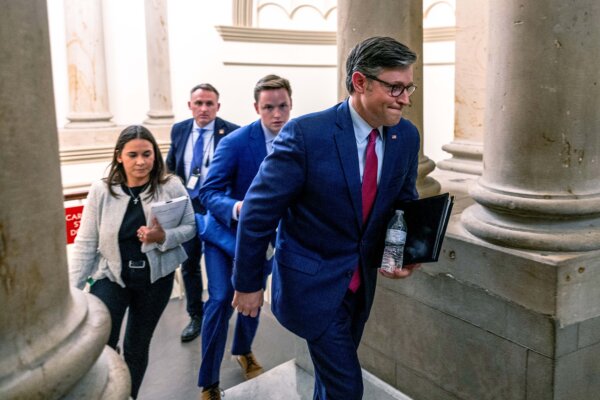
Fourteen Republicans voted against a plan to extend government funding by six months and include a voter integrity measure.
WASHINGTON—The House failed to pass a temporary spending fix on Sept. 18, leading to the possibility of a government shutdown.
The GOP measure aimed to extend the government funding deadline by six months but was rejected by a 202–220 vote in the House, with 14 Republicans voting against it. Three Democrats supported the bill, while two members voted “present.”
In addition to extending the funding deadline to March 2025, the bill included the Safeguard American Voter Eligibility (SAVE) Act, which required proof of citizenship to register to vote.
Democrats opposed the plan and called for a three-month stopgap bill without any policy riders, known as a “clean” continuing resolution. They argued that existing laws already prevent noncitizens from voting, making the SAVE Act unnecessary.
Republican objections to the spending plan varied, with some opposing the use of continuing resolutions, others deeming the spending levels too high, and some concerned that a six-month stopgap would leave the military underfunded for too long.
Following the bill’s failure, House Republican leaders will need to reassess their approach with just 12 days left until government funding runs out. Some Republican members believe that leadership will ultimately opt for a clean continuing resolution with the help of Democrats.
No Republican Consensus
The legislation was initially scheduled for a vote the previous week, but House Speaker Mike Johnson (R-La.) pulled it from the floor on Sept. 11 due to opposition from both Republicans and Democrats. He stated that the bill was still in the “consensus-building” phase.
Rep. Thomas Massie (R-Ky.) opposed continuing resolutions on principle, advocating for Congress to pass the 12 required funding bills individually instead of bundling them into continuing resolutions or large omnibus spending bills.
While the SAVE Act was included to garner more Republican support, many criticized it as a “show vote” that would not become law or be implemented before Election Day.
Despite this, some Republicans saw value in forcing Democrats to take a stance on the issue.
Rep. Byron Donalds (R-Fla.) planned to support the legislation, suggesting that dealing with funding should be left to the next president for better compromise.
Rep. Tom Cole (R-Okla.) emphasized the importance of the SAVE Act in light of the crisis at the southern border.
“I’m extraordinarily perplexed that the idea of reaffirming in a time of unmitigated disaster at the southern border that you got to be an American citizen to vote in election is somehow controversial,” he said.
Democrats Promised to Kill the Bill
Rep. Rosa DeLauro (D-Conn.), the ranking member of the House Appropriations Committee, criticized the bill, stating that noncitizens are already prohibited from voting in federal elections.
DeLauro asserted that the bill demonstrated the inability of the House Republican majority to govern effectively.
Even if the bill had passed the House, Senate Majority Leader Chuck Schumer (D-N.Y.) had indicated that he would not bring it to a vote in the upper chamber, referring to the SAVE Act as a “poison pill.”
The failure to pass the legislation leaves leaders back at square one in funding the government. The House has passed five of the 12 necessary appropriations bills, but none have been taken up in the Senate due to contentious cultural provisions.
The Senate has yet to pass any funding bills.
Traditionally, when government funding approaches in September, lawmakers delay the issue until the end of December before passing a comprehensive omnibus spending bill with the support of most Democrats and some Republicans.





